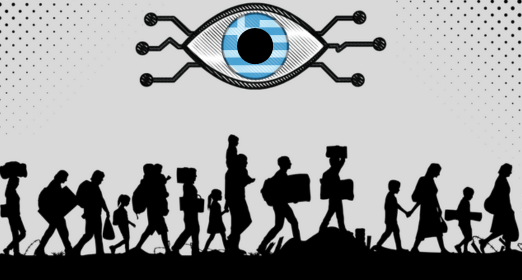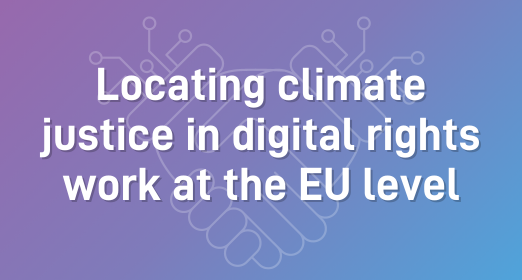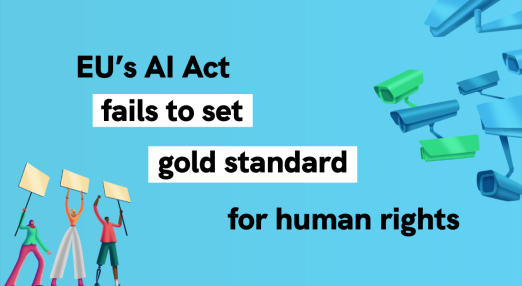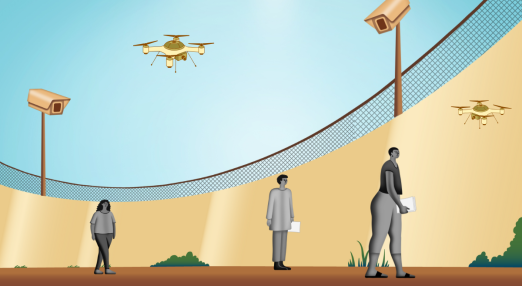Artificial intelligence (AI)
Artificial intelligence (AI) refers to a broad range of processes and technologies enabling computers to complement or replace tasks otherwise performed by humans. Such systems have the ability to exacerbate surveillance and intrusion into our personal lives, reflect and reinforce some of the deepest societal inequalities, fundamentally alter the delivery of public and essential services, undermine vital data protection legislation, and disrupt the democratic process itself. In the face of this, EDRi strives to uphold our fundamental rights, democracy, equality and justice in all legislation, policy and practice related to artificial intelligence.
Filter resources
-

Greek Ministry of Asylum and Migration face a record-breaking €175,000 fine for the border management systems KENTAUROS & HYPERION
On 3 April, the Greek Data Protection Authority (DPA) slapped the Ministry of Asylum and Migration with a record-breaking €175,000 fine under the General Data Protection Regulation for the border management systems KENTAUROS and HYPERION. The DPA’s investigation started back in 2022, following a strategic complaint filed by the EDRi member Homo Digitalis and its partners in Greece.
Read more
-

Locating climate justice in digital rights work at the EU level
A new study commissioned by EDRi acknowledges the complexities and environmental impacts of technological solutions, emphasising the need to bridge climate justice and digital rights. This is particularly relevant as the European Union views sustainability and digitalisation as twin and interconnected pillars.
Read more
-

EU’s AI Act fails to set gold standard for human rights
A round-up of how the EU Artificial Intelligence (AI) Act fares against the collective demands of a broad civil society coalition that advocated for prioritising the protection of fundamental human rights in the law.
Read more
-

Council to vote on EU AI Act: What’s at stake?
The EU Council is set to vote on the AI Act on 2 February after three years of negotiation on this legislation. Our civil society AI coalition summarises the latest updates, what is at stake, and civil society's views on the AI Act.
Read more
-

EU AI Act: Deal reached, but too soon to celebrate
On 8 December 2023, following over 36 hours of negotiations, EU lawmakers finally cinched a deal on the Artificial Intelligence Act. However, whilst some fundamental rights protections have been won, the overall Act has not lived up to its potential to put people and their rights front and center.
Read more
-

NGOs and experts warn AI Act negotiators: don’t trade our rights!
On 8 December 2023, 70 civil society groups and 34 expert individuals sent an urgent letter to the Council of EU Member States, the European Commission and the European Parliament to urge them "Do not trade away our rights!" in the final trilogue (negotiation) on the landmark Artificial Intelligence (AI) Act.
Read more
-

New educational videos about AI in media, privacy & digital exclusion. Here is what they show
You can now watch all ten videos about artificial intelligence (AI) in the media, cybersecurity for journalists, but also about digital exclusion and the impact of digitalisation on people with disabilities. This is one of the final outputs of the project „Promoting human rights in the digital era“, which involved members of EDRi Iuridicum Remedium (IuRe) from the Czech Republic and Elektronisk Forpost Norge from Norway.
Read more
-

Civil society statement: Council risks failing human rights in the AI Act
In the run up to EU AI Act trilogue negotiation, 16 civil society organisations are urging representatives of the Council of the European Union to effectively regulate the use of AI systems by law enforcement, migration control and national security authorities in the legislation.
Read more
-

AI Act: What happens when lawmakers’ faces get scanned with face recognition algorithms?
EDRi member in Italy Hermes Center simulates face recognition on lawmakers to pressure them for a total ban of remote biometric identification (RBI) in the Artificial Intelligence (AI) Act.
Read more
-

The EU wants to make facial recognition history — but it must be done for the right reasons
Whilst civil rights activists have long called for an outright ban, certain EU lawmakers may see the AI Act as an opportunity to claim that they are doing the (human) right(s) thing — and actually doing the opposite.
Read more
-

EU AI Act Trilogues: Status of Fundamental Rights Recommendations
As the EU AI Act negotiations continue, a number of controversial issues remain open. At stake are vital issues including the extent to which general purpose/foundation models are regulated, but also crucially, how far does the AI Act effectively prevent harm from the use of AI for law enforcement, migration, and national security purposes.
Read more
-

Unchecked AI will lead us to a police state
Across Europe, police, migration and security authorities are seeking to develop and use AI in increasing contexts. From the planned use of AI-based video surveillance at the 2024 Paris Olympics, to the millions of EU funds invested in AI based surveillance at Europe’s borders, AI systems are more and more part of the state surveillance infrastructure.
Read more
